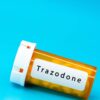Ambien is a brand name medication; the generic form is known as zolpidem.
It is used to treat certain sleep issues (e.g., insomnia). Ambien belongs to a class of medications known as sedative-hypnotics which are used to induce and/ or maintain sleep. The United States Drug Enforcement Administration (DEA) classifies Ambien as a Schedule IV Substance, which are defined as “drugs with a low potential for abuse and low risk of dependence.” When Ambien is taken exactly as directed, under the strict supervision of a qualified medical professional, it can be a highly effective medication.
Ambien is a central nervous system depressant that works by acting on certain neurotransmitters in one’s brain, specifically the GABA-A (gamma-aminobutyric acid-A). When Ambien binds to this receptor it elicits a calming effect as it slows down excessive brain activity and inhibits the specific brain activity associated with insomnia. Ambien is not intended for long-term use; rather short treatment periods lasting one to two weeks long, or less are most common. The average half-life, meaning the length of time the substance will remain in one’s system until the concentration in one’s blood has been reduced by half, of Ambien is about 2.5 hours.
Detox & Withdrawal Timeline
Several factors influence how and when people experience Ambien withdrawal. For example, research indicates that those who take larger doses over a longer period are likely to experience more intense symptoms. Heavy Ambien users are also prone to suffer from withdrawal symptoms for a longer duration than moderate users. The following is a general Ambien withdrawal timeline:
- First 24-48 hours after one’s last dose: Ambien withdrawal symptoms (e.g., rebound insomnia, confusion, mood swings, etc.) tend to begin to appear during this period. For most individuals, withdrawal symptoms during this stage will be mild but increasing.
- Days 3-5 after one’s last dose: This is the peak period for Ambien withdrawal symptoms to occur. Withdrawal symptoms include depression, mood swings, nausea, vomiting, heightened anxiety, stomach cramps, confusion, memory loss, difficulty sleeping, and more.
- Weeks 1-2 after one’s last dose: During this period, the physical symptoms will begin to dissipate, and individuals should start being able to sleep normally without Ambien. However, psychological symptoms like cravings, depression, anxiety, and insomnia can last beyond the two-week time frame.
Depending on the individual, withdrawal symptoms may last as little as a few days or as much as several weeks, and withdrawal symptoms can be compounded by the effects of other substances. Hence, not every Ambien detox timetable is the same.
For Information and Support
Contemplating detox can be a very challenging time. Before any individual can begin to work on the underlying issues contributing to their substance abuse problem, they must be separated from the substances in their systems. If you are concerned for yourself or a loved one regarding substance abuse, and/ or addiction we recommend reaching out for help as soon as possible. The earlier you seek support, the sooner you and your loved ones can return to leading happy, healthy, and fulfilling lives. Sherwood Detox offers a stand-alone detox program. For additional information on detox, please do not hesitate to contact us at: 818-626-9959 or feel free to email us anytime. One of our trusted counselors is available to talk and discuss how we can best support you on your journey.









